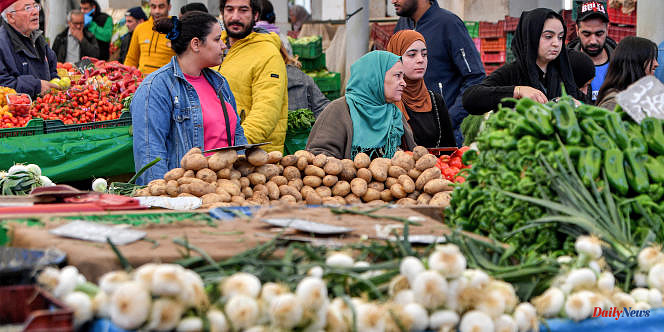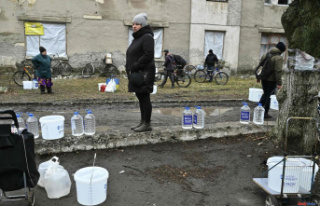Hager grows impatient. Sitting in the living room of this apartment in El-Menzah 8 alongside her daughter Rym and her mother Myriam, she waits for her son to bring tea. "Mohamed where are you?" If you want me to come and help you, tell me,” she says in the direction of the kitchen. Having left a few minutes ago, he takes the opportunity to discreetly smoke a cigarette. "No it's fine, don't worry, I'm coming," he replies from afar. A few moments later, he reappears, glasses in hand, hands them out, then sits back in his chair. Installed around a coffee table, facing the television, the small Annebi family – who preferred to use assumed names – have just finished their first break from the fast of the month of Ramadan and migrated from the dining table to the sofas , located in the same large room.
The plates have just given way to dessert. "These cakes are chickpeas, these are semolina, these are pistachios, and then these are dates," the dean proudly points to the plate on the table. Mohammad takes one. “The vision of Ramadan before was to have a big table with four or five dishes, even if we have leftovers, even if we waste. People felt compelled to consume, to buy more,” he recalls, savoring the candy. “Normally, it is a holy month which should instead be geared towards moderation, but in reality and in Tunisian traditions, it is the month of abundance, of profusion,” his mother continues. "People can't afford to do that anymore," the son continues.
The family, who describe themselves as upper middle class, admit they are not the most sensitive to price changes but are still forced to be careful. "Today, even people who didn't count count," says Hager, usually in charge of errands. There are things that we bought because they were basic necessities, we did not necessarily ask ourselves the question of how much they cost, now we save. As a result, a slightly reduced menu this year: soup, brick (triangle of very thin sheet of dough stuffed with egg) and kamounia (a dish with a strong sauce in cumin).
"Very frustrating"
"What did she say, grandma earlier already?" », tries to remember Mohamed. "She said, 'There's no more tagines on the table!' Hager replies with a burst of laughter. Grandmother Myriam was surprised at the absence of this egg-based dish. A kind of big omelette, a frequent guest at Ramadan tables, to which we add what we have, cheese, parsley, potato, chicken tuna or other, before baking it in the oven.
But Tunisia has experienced galloping inflation in recent months, exceeding the 10% mark in December, January and February. On a daily basis, this price variation is particularly felt in food products, the costs of which rose by an average of 15% in February. This rate also hides dazzling increases. The price of eggs, the main ingredient of the tagine so desired by Myriam, has increased by 32% during 2022. “The frequency of increases is also worrying. It used to go up once or twice a year but now you blink, and that's it the price has changed,” Mohamed chuckles sarcastically.
To limit soaring prices, at least for the duration of the month of Ramadan, the Tunisian government has taken measures. The prices of many foodstuffs, such as meat or certain fruits, have been set by the Ministry of Commerce. For example, it is forbidden to sell bananas at more than 5 dinars per kilo. The price of chicken has been limited to 8.7 dinars per kilo when Myriam's eggs are displayed at 1.480 dinars for a batch of four.
But for Hager, it is already too late. "The kilo of lamb at 40 dinars today...for a family of four it's a meal!" Traditionally, it is the meat that every Tunisian family wants to have on their table. Having to do without it or replace it is very frustrating, regrets Hager. It's huge for a minimum wage of 460 dinars. " In 2021, the organization International Alert Tunisie, the Institute for Economic and Social Research and the Tunisian office of the Friedrich-Ebert-Stiftung had estimated that the "budget of dignity (…) to allow a family today type of access to dignified living conditions" amounted to 2,400 dinars per person, well above the minimum wage.
"Dreary Atmosphere"
Aside from prices, the shadow of the shortages that recently hit the country still looms large, even as grocery stores appear to have restocked shelves. Hager lists all the available and unavailable foodstuffs she observed when she went shopping for this meal. "At the supermarket today, a gentleman said to me: 'As if by some miracle, the cows started producing milk on the day of Ramadan, until yesterday there was none.' And indeed, there are now galore! “, she says, hilarious.
Myriam nods to her daughter's every word while remaining focused on the television. The soap opera "Jbel Lahmar" has just started. Directed by the Tunisian Rabii Takkali, this "Ramadanesque" series focuses on the eponymous district, a popular area with a sulphurous reputation, perched on a red mountain from which it takes its name. A series to deconstruct the stereotypes that stick to the inhabitants? In any case, the octogenarian does not seem convinced. "The program looks mediocre," she said. The taste is not there.
"The crisis, I have the impression that it has a fairly significant impact in general on the way Tunisians perceive or experience Ramadan. It's become less and less festive", analyzes Rym who has just finished brilliant university studies. "I hear people around me talking all the time, 'Prices have changed, prices have gone up.' At the checkout in the supermarket, I listen to the price people are paying,” remarks Mohamed. “There is no longer this energy, I do not feel this Ramadan atmosphere where everything is in abundance, where the sellers and sellers are particularly friendly. It's gloomy," Hager said. Miriam nods her head.
For months, the prices of foodstuffs or their availability over shortages have become daily topics of discussion, observes the family. "It would be interesting to make an application to map where we find food. It's a project idea,” Rym offers ironically. Despite the situation, the family does not lack creativity and humor. “And again, after that there will be Eid,” concludes Mohamed, referring to the celebration that will conclude the month of Ramadan on April 21.












